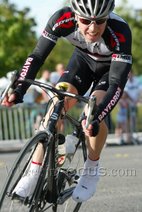 by Coach Lang Reynolds
by Coach Lang ReynoldsLike most American kids, I participated in a lot of sports when I was growing up. Over the years, I have played basketball, baseball, football, ultimate, and lacrosse. I have rowed crew, ran cross country and track, wrestled, and raced bikes. Amont those I was exposed to, I eventually gravitated towards the endurance sports, and over the last ten years have spent most of my time outside either running or riding my bike.
Cycling and running are both fantastic sports; I am very thankful to have discovered them at a relatively early age and have already enjoyed a decade of participation. They also have in common, however, something you don't get in stick-and-ball sports: a certain neurosis (shared with their sister sport triathlon) at the competitive level with regard to body weight (surpassed only by another sport in which I've participated, wrestling, which gives most every participant a bona fide eating disorder by the time they graduate).
This obsession stems from the cruel reality of the physical laws we all learn in high school (you must produce a force to accelerate your mass) and also from the many images of the sports' archetypes and heroes. Take Lance Armstrong's famously meticulous weighing of food on a gram scale, or the incredibly gaunt Janez Brajkovic, celebrating his second place in last October's Giro di Lombardia. This image has changed over time: compare, for example, Eddy Merckx, Raymond Poulidor, or Bernard Hinault with Alberto Contador, Denis Menchov, or Carlos Sastre.
In looking at these images of athletes at the top level of the sport, we must understand a few important facts. Putting aside the question of doping (a whole can of worms for another day), these athletes are professionals for a reason, namely that they are prodigiously talented. This is not to say that they do not train and prepare vigorously, but simply that a high level of talent is a prerequisite for achievement at the top level of the sport. Talent has many facets, one of which is body type. Simply put, the Darwinian process of victory has selected for athletes that not only have huge engines but are also predisposed to being relatively skinny. More importantly, though, is the fact that being at the top level of the sport requires attention to every detail that affects performance. They have already maximized the effectiveness of their training, perfected their position on the bike, and ensured the relative supremacy of their equipment.
During almost every group ride or training session I overhear talk of losing weight or being overweight, and I must confess being guilty of participating in such talk at times. When it comes down to it, however, performance gains realized through weight loss are usually quite small, depending on how much weight an athlete has to lose, especially compared to the performance gains realized by concentrating on increasing sustainable power. Even on a climb such as Crystal Mountain, the state Hill Climb Championship course, a 5 lb weight loss is easily out-matched by a 7 watt gain in sustainable power for an average rider. Moreover, the side effects of trying to cut weight too quickly and the reduced quality of life inherent in counting calories can also outweigh the potential performance gains. In other words, chill out people. Significant progress can be made simply by maximizing your nutritional regime with respect to your training as well as general food intake. Rather than thinking simply about weight as holding us back or something to reduce, we should think more broadly about general health and proper nutrition first. You will probably not be able to "diet" your way to being faster on the bike, but if you take a hard look at what you put into your body and ensure you eat a selection of highly nutritious food and leave out those foods we know are "bad" for us, you will enjoy better overall health and weight loss will probably follow.
I am not a nutritionist, and there is plenty of information out there on healthful nutrition for the endurance athlete. It's pretty simple, though: eat food that our bodies can use efficiently and provide valuable nutrients in addition to calories, and don't eat those that do not (refined sugars, alcohol, refined grains, etc); time food consumption around ride time; eat moderate amounts.
Body weight is, strictly speaking, a component of performance. It is, however, one small component that frequently receives far more attention than it deserves among other components that have a much larger return on investment for improving performance, in terms of time and energy spent. Here in the endurance sport community, we need to re-frame the topic of weight loss in terms of overall nutrition and health. For all the time spent thinking about how much weight we need to lose, going on a diet, breaking that diet, bonking on a training ride, we could be thinking about and affecting real changes in our complete nutrition that benefit our overall health and are sustainable for years down the road.



